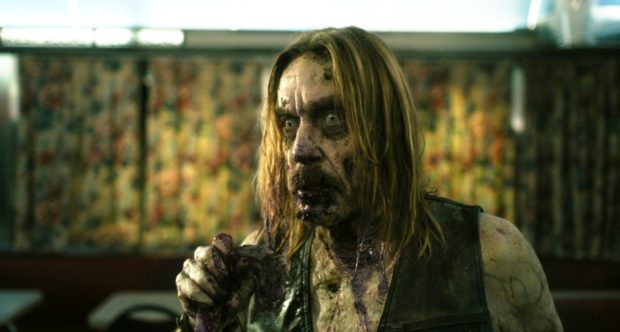 Jim Jarmusch has crafted a zombie film—a comedy that somehow manages to maintain an almost somber tone—doubling as a portrait of America under Trump.
Jim Jarmusch has crafted a zombie film—a comedy that somehow manages to maintain an almost somber tone—doubling as a portrait of America under Trump.
Jim Jarmusch still seems, at least to me, like the daring young innovator of independent film, even though he’s been writing and directing movies for almost forty years. He makes the films he wants to make, without compromise and without interference, and consequently his body of work stands almost alone in the American cinematic landscape, as the vision of one artist. He sometimes likes to adopt a well-known film genre and create a picture that ends up being completely atypical of that genre, for instance, Dead Man, back in ’95, was a western unlike any other you’ve ever seen, and recently in 2013, Only Lovers Left Alive was a vampire film that even I, who generally don’t like vampire films, admired and reviewed on this show. And now, for reasons which will become clear, he’s made a zombie film called The Dead Don’t Die.
The story is set in Centerville, which is “a really nice place” according to a sign at the entrance to the small town. I imagine there are very few people who will recognize this as a quote from a Frank Zappa record, but there it is—in this movie, Jarmusch indulges even more than usual in pop culture references and in-jokes. He pays tribute especially to George Romero’s Night of the Living Dead—the granddaddy of zombie films—even the car in that movie, a Pontiac Lemans, makes an appearance.
The tale centers on three local cops, played by Bill Murray, Adam Driver, and Chloë Sevigny. As the film begins, Murray and Driver are investigating a complaint that a forest-dwelling hobo named Hermit Bob, played by Tom Waits, has stolen a chicken from a local farmer, played by Steve Buscemi. Strange things begin to happen. Daylight lasts far longer than it should, with no sign of the sun setting even at 8:30 PM. Evidently, as we hear from news broadcasts, polar fracking has resulted in the earth shifting on its axis, with dire and unpredictable results. Then the town is shocked by a grisly double murder. Eventually the three police officers realize that dead people are coming out of their graves and attacking the living. It is a zombie apocalypse.
Did I mention that this is a comedy? I guess not. Describing it sounds zany and silly, but in fact the humor is extremely dry. This means that no matter how outrageous the plot is, the picture doesn’t turn into some kind of wacky spoof or parody.
Jarmusch has invited a bunch of familiar actors into his zombie film—Tilda Swinton is on hand as a bizarre funeral director wielding a samurai sword; also appearing are Rosie Perez, Danny Glover, Selena Gomez, Carol Kane, Iggy Pop, and others. The film is very funny—I laughed out loud quite a few times—but somehow Jarmusch also maintains an edgy, almost somber tone. I suppose part of that might be due to the blood and gore, which I have to warn you, is copious; but I think also that the director deliberately maintains a sense of horror right alongside the absurd comedy, in his writing and his direction of the actors. Bill Murray’s deadpan delivery, in particular, has never seemed more appropriate.
There’s a purpose behind all this, I’m convinced, made clear by one clue, which is not a subtle one. We see Buscemi’s character wearing a red hat that says, ungrammatically, “Keep America White Again.” And although the rest of the film communicates more through tone and suggestion than through such an obvious reference, it seems clear to me that Jarmusch has decided to present his vision of America as it is now, and has been for the last two and a half years. This is uncharacteristic, but then so are the times. And like the real situation we’re all living through, the film seems ridiculous and unbelievable, but also scary and disgusting and obscene.
By now most of us are familiar with the zombie narrative as a metaphor for all manner of social pathologies. The Dead Don’t Die runs with this, further than anyone has attempted before, identifying it completely and unreservedly with our current national nightmare.

Korean director Bong Joon-Ho presents a science fiction action adventure about a child’s bond with a super-pig, corporate greed, and the evils of factory...

A Finnish woman on a Russian train is aggravated by the man with which she’s forced to share a compartment: an insensitive young tough...

Debra Granik’s latest film tells of a father and teenage daughter trying to live in the woods, outside of society, and the challenges to...